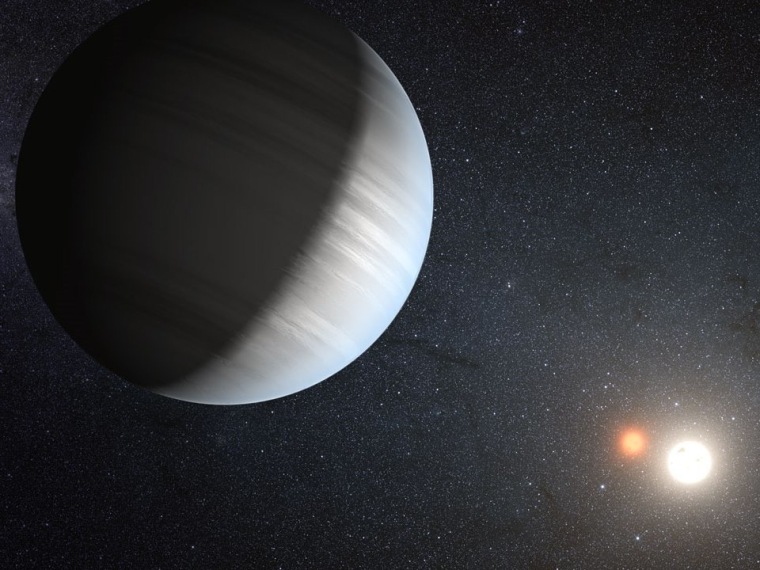Got a name for an alien planet? The International Astronomical Union says it's now open to public suggestions, and even contests to name celestial objects — as long as it has the final say.
The rules were laid out last week, after months of discussion and a controversy over a privately run contest to name the nearest known exoplanet. That alien world, known by the scientific name Alpha Centauri Bb, was labeled Albertus Alauda as the result of a contest run by a fundraising venture known as Uwingu. Since then, Uwingu has kicked off another planet-naming effort, titled "Adopt-a-Planet."
Uwingu's contests would still run afoul of the IAU's new rules — both because the venture charges fees for nominating and supporting names, and because the IAU hasn't been consulted about the naming process or the results.
"The process cannot request nor make reference to any revenues, for whatever purpose," the IAU said.
That's just one of the seven rules for public naming campaigns, laid out in a three-page memo from a task group.
For almost a century, the IAU has served as the world authority for naming planets and their satellites. For instance, nearly 18,000 of the 600,000 asteroids that have been identified to date have been named in accordance with the IAU's system. But until now, it's largely been up to the discoverers of a celestial object to suggest its public name.
Cosmic suggestion box
In its latest memo, the IAU said it "fully supports the involvement of the general public, whether directly or through an independent organized vote, in the naming of planetary satellites, newly discovered planets and their host stars." Individual suggestions may be sent to iaupublic@iap.fr, and will be handled on a case-by-case basis.
When it comes to public naming campaigns, the IAU says the initiative's sponsoring organization should send a detailed letter of intent to its general secretary. The discoverers of the objects to be named should give their formal agreement to the process, and the proposed names should be copyright-free. The IAU would have to give its go-ahead for the naming procedure, and sign off on the names submitted by the sponsoring organization at the end of the campaign.
Any proposed names would have to follow the IAU's conventions: They'd have to be no more than 16 characters long, easily pronounceable, non-offensive, non-commercial, and not too similar to the existing name of an astronomical object. The names of pets are discouraged, and the names of individuals, places or events principally known for political or military activities are unsuitable. (Sorry, folks, no "Planet Obama" or "Planet Rand Paul.")
"Organizations not prepared to follow the abovementioned rules cannot be supported by the IAU, and the names resulting from their process will not be recognized by the IAU," the memo says.
'Old school'
Alan Stern, a planetary scientist who is Uwingu's chief executive officer, said he and his colleagues weren't surprised by the IAU's stand. "We did get a chuckle out of the number of statements in their new announcement that contradict their 12 April statement," he said in an email.
"But more fundamentally, we're disappointed that we see the IAU statement as saying they believe the public is subservient to IAU committees that pass on recommendations. Our position is that that is old school. Why should the IAU be a traffic cop?" Stern wrote.
Stern also noted that a number of entities derive revenue from astronomical ventures, ranging from magazines to planetariums. He said one of Uwingu's goals was to raise money for space science, education and public outreach — which is in line with the IAU's goals.
"We think the IAU's no-revenue position is meant simply to block private entities from becoming involved," Stern said.
What do you think? Do you have any cool suggestions for planetary names? Feel free to pass them along in your comments. (But remember, they have to be 16 characters or less.)
Update for 10 p.m. ET Aug. 20: How about Cosmiclogopolis? It can't be worse than the names in this XKCD cartoon. ... Can it?
More about planetary names:
- Pluto moons dubbed Styx and Kerberos after contest
- Who gets to name alien planets?
- NBC News archive on planets
Alan Boyle is NBCNews.com's science editor. Connect with the Cosmic Log community by "liking" the NBC News Science Facebook page, following @b0yle on Twitter and adding +Alan Boyle to your Google+ circles. To keep up with NBCNews.com's stories about science and space, sign up for the Tech & Science newsletter, delivered to your email in-box every weekday. You can also check out "The Case for Pluto," my book about the controversial dwarf planet and the search for new worlds.
